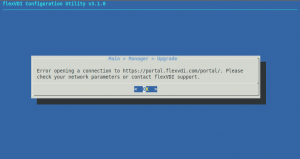flexvdi-config now starts chronyd as the NTP daemon, instead of ntpd in systems that have none of them enabled.
Until now flexvdi-config enabled ntpd if it was not enabled in the flexVDI Host, as part of the setup. Since 3.1.5, it enables chronyd instead, but only if neither chronyd nor ntpd are enabled and running in the system.
flexVDI Hosts that are currently running ntpd, will not be modified by flexvdi-config.
The new release can be updated executing in the flexVDI hosts:
# yum -y update flexvdi-config
